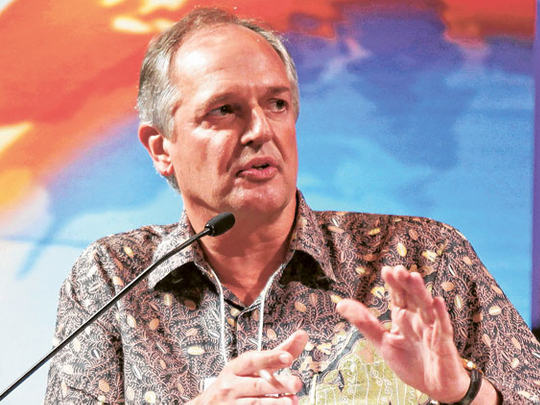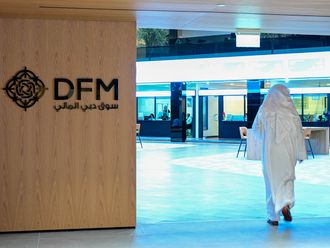
Dubai: It is a given that the effects of economic crises will be felt severely by those companies that manufacture or sell consumer goods. As consumers feel the purse strings tightening, they cut back on non-essential items.
But an increase in demand for products such as tea, biscuits — known as fast-moving consumer goods (FMCG) — gives manufacturers advance hints of growth.
Unilever, one of the world's largest manufacturers of FMCG products, achieved one per cent growth in net profit to €4.62 billion (Dh22.3 billion) and €46.44 billion in sales revenue last year, a 5 per cent increase over the previous year.
Paul Polman, Unilever's chief executive officer (CEO), said in an interview with Gulf News that while emerging markets were in the forefront of growth, challenges remained.
Gulf News: What is your view of the global economy in 2012, especially considering the fallout of the European debt crisis and slowdown in the United States?
Paul Polman: There is no doubt that the Eurozone crisis and the sluggish nature of the US economy will continue to impact the global economy in the year ahead. Necessary though they are, austerity measures in these markets will continue to restrict growth and suppress the consumer economy in 2012 and well beyond. I fully agree with the assessment of the head of the IMF [International Monetary Fund] that "the world economy is deeply into the danger zone".
Do you think the year 2012 will be better than 2011 — looking at the major economies? Do you think the worst is yet to come, or is it over?
Certainly the immediate outlook for the consumer economy in North America and Europe is not good. We expect low growth, at best, in these markets for some time to come. Growth in the emerging markets — where we now have 55 per cent of our turnover — will continue to perform well albeit at a slightly lower rate, though even here we see some softening. Our ambition for 2012 is to once again grow ahead of our markets and we are confident we can achieve that.
How has the year 2011 been, in terms of business, sales, growth and challenges?
Despite challenging conditions 2011 was a good year for Unilever. We delivered strong underlying sales growth of 6.5 per cent, ahead of our markets and outperforming many of our principal competitors by growing in share in over 60 per cent of our business and, more importantly, putting the elements in place for long-term growth.
At the same time we continued to make progress in the transformation of Unilever to a sustainable company. We have an ambitious vision — to double our size while reducing our overall environmental impact. We have also put in place a new business model — the Unilever Sustainable Living Plan — to help drive our growth in an increasingly resource constrained world.
Judging by the performance of the share price, investors like the approach we are taking. Unilever was the best performing stock on the Amsterdam Stock Exchange in 2011.
Where do you see the growth coming from, apart from the Bric countries?
The Asia, Africa and Central and Eastern Europe markets continued to be important growth drivers for Unilever in 2011. Our business in this region grew ahead of the markets by a very healthy 10.5 per cent.
Let's not forget that 2011 was also a year in which the region's consumers lived through the tsunami in Japan, geo-political turmoil in North Africa and the Middle East and more recently the severe floods in Thailand and the Philippines. These parts of the world have often experienced volatility in their growth rates, but this year has seen more volatility than most. And yet our growth has been impressively resilient. Our business today in the Middle East, for instance, is bigger and stronger than before the Arab Spring.
How do you see consumption shaping up in Eurozone and the Americas? Are these markets stagnant — or do you see room for growth?
Our six largest markets all delivered positive sales growth in the fourth quarter 2011 with notably good performances from France and Italy. We anticipate continued challenging macro-economic conditions to prevail in developed markets, but we still see opportunities for growth.
What's the annual value of the sale of consumer products that your company produces?
Unilever turnover in 2011 was €46.5 billion, up from €38 billion two years ago, a performance we are happy with. We now have more than 2 billion consumers using our products daily.
Between the developed and the developing economies, how is Unilever's business positioned regarding sales and investments? Is it 50:50?
We are very well positioned. Around 55 per cent of Unilever's revenue comes from developing economies and that figure is growing year on year. Given the population growth and burgeoning prosperity, particularly in Asia, I can foresee this figure rising to 70-75 per cent.
You are the leading consumer products manufacturer in the worst global financial crisis. At the corporate level, how are you managing the challenges of the slowdown? How do you increase shareholder value?
I am realistic about the prospects of the global economy and we plan prudently. If things surprise us positively, so much the better. We see opportunities, whatever the situation. The key is to make sure we stay close to our consumers, anticipating their needs and offering good value. We need to continuously improve our own performance and invest in long-term growth — through bigger and better innovations, in brand equity, in building manufacturing capacity in emerging markets — and in transforming the business into a company of sustainable growth.
Can you elaborate on Unilever's sustainable initiatives?
Last November the world's population passed the 7 billion mark and within the next 30 years, another 2 billion will have been born. Yet the world's resources are limited. We are facing a future where the most basic resources of food, energy and water will all be in scarce supply. As a business we believe we have a contribution to make and we want to be to be part of the solution. But it will require a whole new way of doing business.
Unilever intends to lead by example through its Unilever Sustainable Living Plan (USLP), which has more than 50 concrete targets that aim to help a billion people take action to improve their health and well-being, to halve the environmental impact of our products and source 100 per cent of our agricultural raw materials sustainably. At the same time we want to link 500,000 small-holder farmers and small-scale distributors into our supply chain so as to improve productivity and help alleviate poverty.
Are you working on a new strategy to boost your sales and business?
We will achieve this mostly through organic growth, although clearly there is scope for bolt-on acquisitions, like Alberto Culver, Sara Lee and now Concern Kalina in Russia. Our portfolio is getting stronger and we are already reaping the benefits of our recent acquisitions, which have been rapidly integrated with examples such as TRESemmé in Brazil and Simple in the US, both launched within nine months of completing the acquisition of Alberto Culver.
Looking at the Middle East, what is your view of the economies of the Mena [Middle East and North Africa], GCC [Gulf Cooperation Council] and the UAE?
We expect some of the impact of the 2011 uncertainties to remain with us, but overall we expect growth acceleration in markets affected by the Arab Spring in 2011 and continued growth in other economies.
How important are the Mena and the GCC markets for Unilever's global business? What percentage of your global sales volume is represented by Mena sales?
Generally, we don't break our sales figures at a sub-regional level, but we have a long established business in the Mena. This is one of the fastest-growing regions and our turnover is driven by leadership positions in most of the categories that we operate in. We have nine manufacturing sites across North Africa and Middle East, and more than 80 per cent of the products we sell are manufactured within the region. Mena remains a focus market to invest in for growth, with a young population that continues to boost consumption. There are also countries in the region where we are not yet adequately represented and we will be looking to increase the presence of our brands in those markets.
What is Unilever doing to boost its sales and increase its share of global sales in Mena? And do you have any plans to invest in expansion in the Mena region, GCC or the UAE?
We continue to invest behind our brands across Mena — in innovation, new brand introductions and in marketing support — so as to develop the markets, to increase the distribution of our products in countries such as Iraq and Sudan, where our presence has been so far limited, and to gain market share. As far as investment in the UAE is concerned we will be investing in significant capacity expansion of the Lipton tea manufacturing facility in Jebel Ali so as to meet the rising demand for tea in the region.
What is your view on the UAE market? How do you see the UAE economy shaping up in 2012?
The UAE market continues on its recovery trajectory after the 2009 crisis and we should hopefully see even more robust growth in consumer demand in 2012.











